Every now and then a Bible passage lends itself to radically diverse, if not contradictory, interpretations. I feel that way about Romans 6:1-11. I am drawn to this passage because it appeals to my need for inner mystical experience. Paul imagines an inner relationship with Christ, that we are united with him in our baptism, and in fact we are so aligned with Christ that we share in the rhythm of his dying and rising. This means there is nothing outside the realm of the presence of Christ.
Speaking strictly from the perspective of our mortality, we die a little bit each day. We experience loss. Or something disappears. Or the world changes. Process theologians have pointed out that all of life is a series of “actual occasions” that die and rise and die and rise and die and rise again. Dying and rising is the fundamental fabric of the universe. Practically speaking we know this to be true. A relationship that once felt secure suddenly changes. The corporate office eliminates a job we loved. A parent passes away, and even though his or her death was not unexpected, it still sends shock waves of loss through our bodies.
Yet Paul is suggesting that there is an inner presence that endures with us in the midst of all our losses. Even though we tend to think of Christ as a person, a passage like this reminds us that Christ transcends the limitations of personhood and morphs into energy, influence, and presence. This means that no matter how much the world is changing on the outside — forever dying and rising — and no matter what it does to us on the inside of our psyches – there is a presence of love, compassion, and transformation that continues with us.
Some might argue that, given the perilous time in which we are living, focusing on the inner Christ represents a retreat from social responsibility. How can we enjoy the luxury of the inner Christ while young black men are threatened by police all across America, or immigrants are living in constant fear of deportation? Injustices like these cannot merely be “spiritualized” away. Changing the outer world demands the deepest spiritual energies of the inner world. It’s in the deepest place of our human experience where Christ lives. So I read this passage from Romans with utter delight . . . in all the dying and rising of the world . . . God is present within me and I find God within it all.
But then I think of a very different starting point with the passage. Rather than basking in the glow of the inner Christ, I take my cue from what is happening in our country right now, specifically, that the President of the United States is pulling America out of the Paris Climate Accord.
I find this decision reprehensible from a variety of perspectives and fear, like Bill McKibben, if our beloved planet can survive the policy changes set in motion by the current administration. Decisions like the withdrawal from the Paris Climate Accord pose a real threat to a planet that is already in an ecological death spiral. It sends the wrong message that economic development is more important than planetary survival. And it also removes America from a stance of moral leadership regarding the future of the planet, relegating us to an insidious position of ecological exploitation, something that is particularly tragic given that we are responsible for so much of the world’s carbon emissions.
This passage from Romans is provocative in light of such a regrettable decision by the Trump Administration. Various process theologians have been arguing for years that we should understand planet earth as the body of God. That is to say, how we treat the earth is how we treat God, and that there is no “God” without earthly embodiment. There is a direct relationship between loving God and taking care of the planet.
The old model was that God created the earth, and human beings were given dominion over it. The earth was a “thing” separate and apart from God. A “thing” to be used by human beings. The new model, and one that makes profound sense to me, is that the earth is the embodiment of the divine presence. It’s not that incarnation happened once and only once in the body of Jesus, but in fact the entire landscape of planet earth is God making incarnate God’s self over and over again.
This means we (and God) are forever dying and rising within the planet. Every second of every single day this happens. To eat food from planet earth is an experience of dying and rising. To take care of the world’s oceans is a process of dying and rising. The same is true of the rivers and mountains and deserts. We die every single time Mother Earth is crucified with ecological exploitation. We die every single time we pour more pollution into the atmosphere or we poison drinking water.
Therefore, as the recent involuntary manslaughter case charging Nick Lyon and four others in the Michigan Department of Health and Human Services with manslaughter attests, the poor decisions made by politicians in order to solve short-term budgetary woes in Flint, Michigan are more significant than numbers on a balance sheet. They are to be understood and undertaken in the future with the full knowledge that lives hang in the balance with each act of environmental impact (positive and negative) we take. Just as we are united with the inner presence of God’s love in a deeply personal way, so we are united with the earth as the body of the crucified Christ.
Our opportunity (and calling) is to work for the well-being of our holy universe. We must be part of the unfolding process of resurrection and redemption. Reducing our consumption. Recycling our products. Reducing our carbon footprint. We can be part of a global resurrecting body of God by advocating for policies that protect the planet, and if we’re lucky, perhaps we can reverse the ecological crisis we have brought upon ourselves. I love the relational vision Paul articulates in this passage, but it cuts in two directions — the inner feeling of knowing that Christ is with us in all our living — but also that we are united with Mother Earth as the body of God, and that its dying and rising is the ongoing life of the divine presence.
Via ON Scripture.
Got something to say about what you're reading? We value your feedback!







